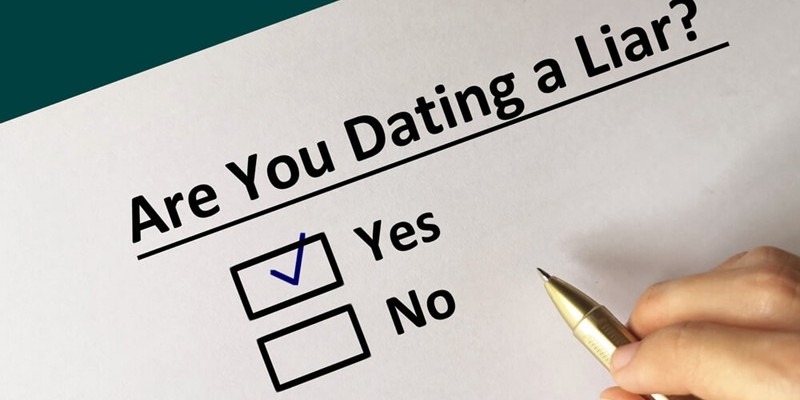Love's Mirage: Surviving a Relationship with a Liar

Navigating the complex terrain of relationships can be both exhilarating and challenging. One of the most formidable challenges is dealing with a partner who engages in deceit. In this exploration of love's mirage, we'll delve into the two types of liars, recognize the signs of dating a liar, understand the profound impact lying can have on a relationship, and discuss strategies for coping with habitual deception.
The Two Types of Liar
Understanding the motivations behind lying is crucial for dealing with deception in a relationship. There are generally two types of liars: the Occasional Liar and the Habitual Liar.
The Occasional Liar: Occasional lying often stems from fear, a desire to avoid conflict, or protect someone's feelings. While not excusable, occasional lying may be a misguided attempt to maintain harmony. This type of liar may acknowledge their falsehoods when confronted, showing remorse and a willingness to change.
The Habitual Liar: On the other hand, habitual lying is a more pervasive behavior. It goes beyond occasional falsehoods and becomes a pattern of deception ingrained in the person's character. Habitual liars often lie without apparent reason, creating a web of deceit that can be challenging to untangle. They may lack empathy for the impact of their lies on others and struggle to maintain trust in relationships.
Signs You Are Dating a Liar

Recognizing the signs of a dishonest partner is vital for maintaining a healthy relationship. Here are some common indicators that you may be dating a liar:
Inconsistencies in Stories: A liar may struggle to keep their stories straight, leading to inconsistencies when recounting events. Pay attention to discrepancies in their narratives, as these can be red flags in the relationship.
Defensiveness: Habitual liars often become defensive when questioned about their behavior. If your partner becomes overly protective or avoids addressing your concerns, it may be a sign of dishonesty.
Unexplained Gaps in Time: A partner who consistently fails to account for their whereabouts or offers vague explanations for unexplained absences may be hiding something.
Exaggeration or Bragging: Liars may embellish their achievements or experiences in an attempt to create a more favorable impression. Watch out for an excess of grandiose stories that seem too good to be true.
Avoiding Eye Contact: The eyes are often referred to as windows to the soul. A liar may avoid direct eye contact due to guilt or a fear of being caught in their deception.
Changes in Body Language: Inconsistencies between verbal and non-verbal cues can be revealing. Watch for signs of nervousness, such as fidgeting or unusual body language, when discussing certain topics.
How Lying Can Affect A Relationship

The consequences of lying extend far beyond the act itself, permeating the very foundation of a relationship. Here's how habitual lying can impact the dynamics between partners:
Erosion of Trust: Trust is the bedrock of any healthy relationship. Habitual lying erodes this trust, making it challenging to believe your partner's words or intentions. Once trust is compromised, rebuilding it becomes an uphill battle.
Communication Breakdown: Open and honest communication is essential for a strong relationship. Lying creates a barrier to effective communication, leading to misunderstandings, frustration, and a sense of emotional distance between partners.
Emotional Distress: Discovering that your partner has been lying can cause significant emotional distress. Feelings of betrayal hurt, and disappointment can take a toll on your mental well-being and overall happiness.
Strained Intimacy: Intimacy thrives on vulnerability and authenticity. Lying creates a facade that hinders genuine emotional connection, leading to a sense of emotional unavailability and detachment between partners.
Coping With Habitual Lying
Surviving a relationship with a habitual liar requires resilience, self-reflection, and open communication. Here are strategies to cope with the challenges of habitual lying:
Establish Boundaries: Clearly define your boundaries and communicate them to your partner. Establishing clear expectations sets the stage for open communication and helps both partners understand the consequences of breaching trust.
Open Communication: Foster a safe space for open and honest communication. Encourage your partner to share their feelings and concerns, and reciprocate by expressing your own emotions. Effective communication can break down barriers and create a foundation for rebuilding trust.
Seek Professional Help: If lying persists despite efforts to address the issue, consider seeking the guidance of a relationship counselor or therapist. Professional intervention can provide a neutral space for both partners to explore the underlying issues contributing to dishonesty.
Practice Self-Care: Dealing with a habitual liar can be emotionally draining. Prioritize self-care to maintain your mental and emotional well-being. Engage in activities that bring you joy, surround yourself with a supportive network, and consider seeking therapy for individual support.
Evaluate the Relationship: Reflect on the relationship and assess whether it aligns with your values and goals. If habitual lying persists and compromises your well-being, it may be necessary to reevaluate the sustainability of the partnership.
You may also like to read: 10 Signs You Might be Dating the Wrong Person
Conclusion
Surviving a relationship with a liar requires patience, understanding, and a commitment to self-care. By recognizing the signs of dishonesty, understanding the impact of lying on a relationship, and implementing effective coping strategies, individuals can navigate the challenging terrain of love's mirage with resilience and strength. Ultimately, fostering open communication and rebuilding trust are key components in overcoming the hurdles posed by habitual lying, creating a foundation for a healthier and more authentic connection.
This content was created by AI





